Summary 
Strong outdoor production staged with an all-male cast, the actors onstage and warming up as the audience enters the theatre. Pleasantly spirited, with emphasis on hand-clapping dance routines and song - everyone sings at the beginning, a guitarist plays for Don Pedro, Dogberry delivers a rousing "Two Hounds A-Brayin'", and Claudio's penance includes a mourning dirge - with music from a superb small chamber-orchestra in the balcony. Directed with insightful flourishes, the production benefits from sensitive performances of the female characters - especially the quite matronly Beatrice - and the all-male cast is an interesting glimpse at Elizabethan production value. The eavesdropping scenes are the comic highlight, Benedick pretending to be a planter and getting watered, and the manly Beatrice snapping a tree in half with her bare hands. The second half begins with the Watch streamlined to just one officer and is quickly paced and entertaining, concluding with the entire cast in a shoe-loosening line dance.
Design
Directed by Jonathan West. Costume design by Lauren M. Lowell. Scenic design by Kristin Ellert. Lighting design by Sarah Maines. Musical direction and compositions by Shannon O'Neill.
Cast
Thomas Anthony Quinn (Leonato), Matt Daniels (Benedick), Michael Pine (Claudio), Norman Moses (Dogberry), Todd Denning (Don Pedro), Christopher Prentice (Beatrice), Colin Lawrence (Hero), Phillip Ray Guevara (Don John), Ron Roman (Borachio), Joey Banks (Conrade), Jack Dwyer (Margaret), Colin Trevino-Odell (Ursula), Fredric Stone (Friar Francis), Timuchin Aker (Verges), Wigasi Brant (Hugh Oatcake).
Analysis
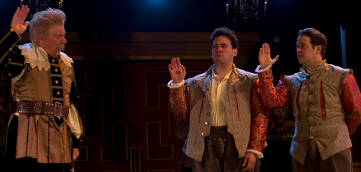
Jonathan West directs Much Ado About Nothing for the 37th Illinois Shakespeare Festival, and he explores original Elizabethan-theatre practices, including an all-male cast. The four female characters - a demure Hero, a bushy eye-browed Margaret, and a strapping broad-shouldered Ursula, along with a stern-jawed and matronly Beatrice in the lead - are played by men, and the ensemble is already onstage preparing for the performance as the audience enters and takes their seats. The actors mill about the stage, applying make-up, doing exercises and vocal warm-ups, two of them ramping up with high-five low-five hand slaps. The dark-paneled set is lit with holiday-like string lights and from a glittering chandelier the big Ursula raises to the fly with powerful tugs on a rope. The ensemble, joined by audience members in bench-style seating in booths on each side of the stage, take turns making requests for proper theatre etiquette - "it's 1601, what's a cell phone?" - and announcements regarding the repertory - "the other plays have girls, too" - along with encouragements to publicize the Festival on Facebook and Twitter, concluding with a choric, "enjoy our play!"
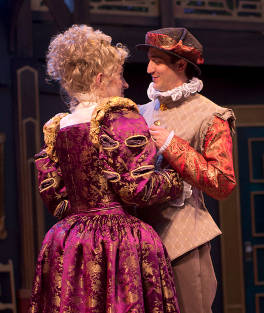
West places entertaining emphasis on dance and live original music, beginning with the entire cast onstage for a song, dancing in smooth side-steps, punctuating with hand-claps the music played by a small chamber orchestra of three musicians above them in the balcony. The production is classically scored with superbly played string-oriented original music, as richly integrated as a Hollywood film. The music is jaunty for the 2.1 celebration, played as the characters don their disguises, continuing into a four-couple square dance that cleverly brings the speaking couple downstage. The line dance includes hand-claps and double-claps as well as rhythmic foot stomps, and the entire cast seems to enjoy the performance. During 2.1, Todd Denning's lonely leader Don Pedro lies flat onstage as a guitarist strums and sings "Sigh No More" for him before leading the Love Gods in "Hey Nonnie Nonnie," and Norman Moses as the gray-mustached Dogberry kick-starts the second half of the production with another stomp-and-clap song - "The Hounds Are A-Brayin'!" - that ends with a big finish, him on one knee downstage center for an extended warbling note. Michael Pine's portrayal of Claudio is highlighted by his somber 5.2 tribute-in-song to the supposedly dead Hero, crooning softly while holding a single candle in the blue-lit near-darkness, accompanied by cello and a pair of recorders. And the happy ending comes with a lively song and a kick-heavy dance, punctuated by shouts of "hey" and rhythmic hand-clapping, and despite - in this performance - a blown shoe that hobbles one dancer and incites a scramble after it that amuses fellow dancers as well as the audience.
West weaves details within scenes to help illuminate relationships and circumstances. In the 1.1 opening scene, the main focus is Benedick's return with his fellow soldiers, all in white suits, led by the imposing Don Pedro in his red cap. West has Matt Daniels's gray-goateed Benedick pretend to check the shine on his shoes, then gravitate toward Beatrice, and soon they are circling each other like fighters in a boxing ring, circling faster and faster. Other details abound: Don John is loath to shake hands, the smiling Hero demurely drops her handkerchief at Claudio's feet, Daniels's Benedick pantomimes hanging himself at the mention of marriage, and Margaret and the beefy Ursula giggle like schoolgirls then lift their skirts to flee the stage.
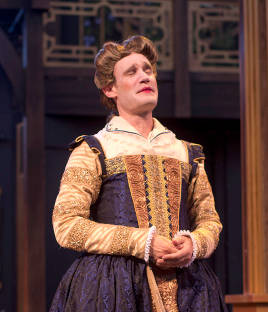
While Ursula - running in place with glee during 2.1 - is played for broad humor, Hero and Beatrice are portrayed without gimmickry, Colin Lawrence imbuing Hero with a natural femininity and coy intelligence, and Christopher Prentice as Beatrice gives the best performance of the production. Obviously a man in a wig and a dress, Prentice plays Beatrice with a dignified maturity, almost a hard-jawed steely acceptance of her spinster fate. Powdery-faced and vampire pale, ghastly and physically unappealing as a woman, Prentice's Beatrice is nonetheless a quick-witted free spirit - "she wakes herself with laughing" - capable of tenderness in her rejection of Don Pedro's advance as well as overkill later in her anger: "kill Claudio." Her 4.1 frustration - "o, that I were a man!" - is deliciously ironic, and her sharing of bedroom-eyed glances with Benedick before the wedding is cute, but Prentice's best moments come with the 3.1 eavesdropping deception. When she hears of Benedick's love for her, Prentice's Beatrice nearly knocks over a planter then bursts into delighted laughter, and in her urgency to move past the potted trees to get closer to the gossiping Hero and Margaret, she snaps a tree in half - "what fire is in mine ears!" - then in a panic tries to screw it back together. She pats her heart in acceptance of both the man - "Benedick, love on!" - and her own feelings.
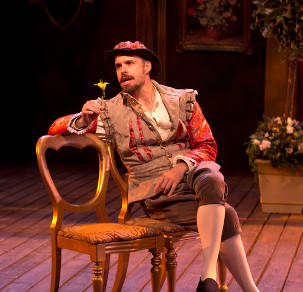
Daniels's Benedick frequently plays directly to the audience, complaining to them "it's come to this!" over Claudio's infatuation with Hero, adopting an outrageous accent for the masque, and then showing first anger then nausea at the prospect of marriage during his 2.3 soliloquy. He details his requirements to audience members on one side of the stage - "rich she shall be, that's certain" - before sprinting for cover to the other side and burrowing his way among audience members into a seat on their bench. He uses a playbill program to hide behind as he leans forward to better overhear the scripted conversation of the Love Gods, then bolts upright as if electrocuted at the mention of Beatrice's love for him. He hides behind planters and chairs, sticks a flower between his teeth and absurdly tries to hide behind another, and he endures being sprinkled from a water can by Don Pedro while he listens in. He leaps up at a "between the sheets" remark, sending flowers flying, and once alone he fairly beams in love at the audience: "the world must be peopled!" Daniels's Benedick, much like Prentice's Beatrice, seems to enjoy the bloom of youth with his newfound romantic feelings, and he does not shave his goatee as expected but instead just dyes it darker.
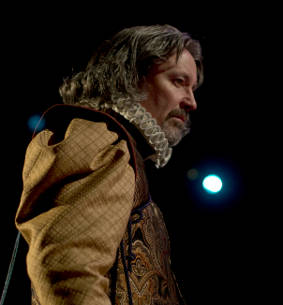
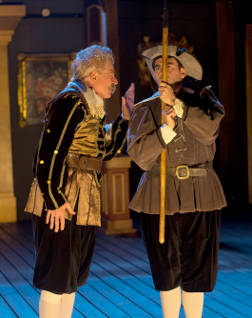
The supporting characters are well played but of course upstaged by the colorful Dogberry. West wisely streamlines the Watch to only include Hugh Oatcake, a thin and quivering officer brandishing a pitch fork, along with Verges, who sights down a hoe as if he is wielding a long rifle. The motley crew rub each other's shoulders, thump chests, jump up and down, then bow to each other repeatedly in a stylized routine before Moses's Dogberry kisses Verges on the mouth and exits. Don John represents a formidable villain - "I'd rather be a canker in a hedge" - watching the 2.1 masque with a snarl from the balcony, and his henchman Borachio proves something of a drunk, spitting booze when arrested by Oatcake 3.3 and belching his name before the sexton 4.2. The portrayal of Leonato as a concerned father is particularly effective, as he cradles Hero's face 4.1 and defies the soldiers 5.1: "thou hast killed my child." Less successful is a cartoonish sexton, a fake-bearded hambone with a crimson book and a big green quill, although Moses saves the scene with his charge of "everlasting redemption."
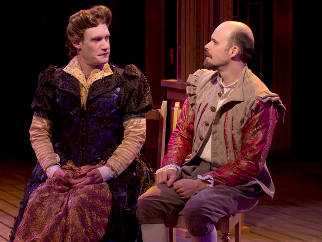
West's 5.2 conclusion is a rush to a happy ending. Daniels's Benedick beats on a tambourine while reciting from a book of bad love poems, his kiss of Beatrice interrupted by Ursula, who rushes onstage with girlish squeals but exits with a show of burly strength, a pair of chairs seized in one meaty paw. Even loose ends are effectively tied by West, with Hero making a point to kiss Margaret's hand as a sign of forgiveness, and Benedick similarly embracing Claudio, who in turn teases his friend with fingers pointed for a cuckold's horns. After Claudio leaps in joy at the revelation that Hero is alive, Prentice's black-veiled Beatrice lurches onstage - "which is Beatrice?" - in a kind of blinded spinning rush. Before the concluding song and dance, the newly wise Benedick counsels Don Pedro - "get thee a wife" - in an amusing ending to an intelligently-crafted production.